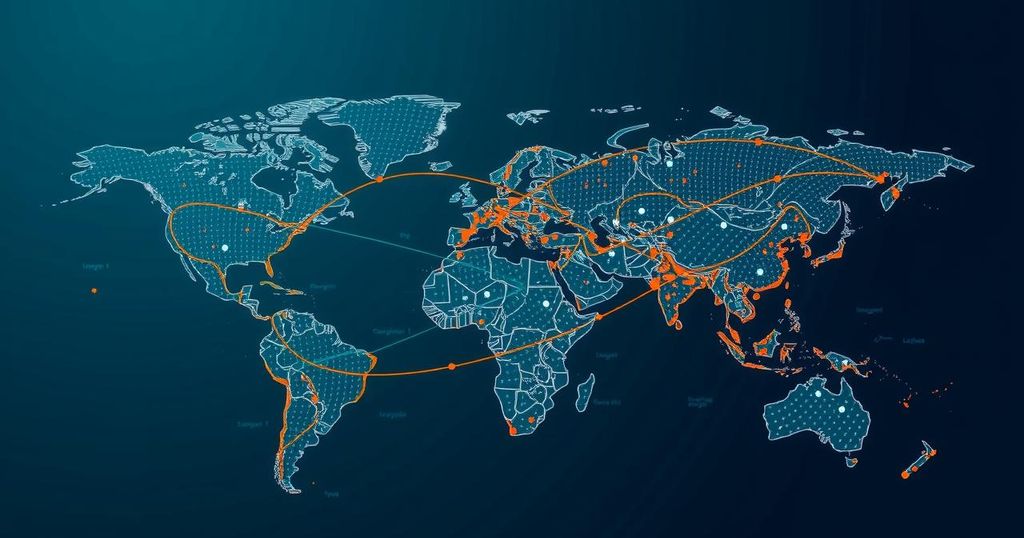Prime Minister Modi’s foreign policy prioritizes human-centered approaches to navigate global challenges. India has shifted from observer to influential player, advocating for consensus-building and humanitarian efforts. Key highlights include managing tensions with China and Pakistan, pursuing regional development, and a commitment to sustainability and clean energy. Modi’s diplomatic strategies emphasize dialogue over conflict and aim to enhance India’s stature in international relations.
India’s approach to foreign policy, under Prime Minister Narendra Modi, highlights a human-centric strategy that aims to establish the nation as a significant global player amidst various challenges. Rooted in concepts such as dharma—meaning duty—and the notion of the world as one family, India has transformed from an observer to an influential entity on the global stage. Modi’s leadership has emphasized consensus-building, economic growth, and humanitarian efforts, allowing India to make substantial contributions during crises like pandemics and natural disasters. The Modi administration has navigated complex international landscapes, leveraging plurilateral frameworks to address conflicting positions, notably as seen in India’s response to the Israeli military actions while maintaining good relations with Israel. Modi’s diplomatic narrative promotes dialogue over conflict and the importance of resolving tensions peacefully, as illustrated during India’s G20 presidency where he advocated for open discussions to settle disputes, notably regarding the war in Ukraine. India faces ongoing challenges with China and Pakistan, maintaining a no-tolerance policy on terrorism while enhancing its military readiness. Restoration of patrols along the Line of Actual Control exemplifies India’s strategy of balancing military strength with diplomatic engagement. Furthermore, Modi’s recent discussions with Chinese President Xi Jinping at the Brics summit signifies a potential thaw in relations, focused on achieving economic parity and cooperative frameworks. Modi’s Neighbourhood First policy aims to foster regional growth and bolster alliances with neighboring countries. Despite ongoing political shifts, exceptional pragmatism in diplomacy continues to be demonstrated. The Indian government recognizes the significance of effective aid management within its neighbourhood initiatives. In terms of global leadership, India’s commitment to sustainability and clean energy has manifested through achieving and exceeding its Paris Agreement commitments. Modi’s focus on digital technology has enabled India to share its innovations, particularly with low-cost services that could bolster international collaborations. However, India must strategically navigate the risks of de-risking from the Chinese economy, as well as maintain economic momentum toward becoming a third-largest economy globally through enhanced participation in regional trade frameworks. Nonetheless, the repercussions of international conflicts, notably in Ukraine and Gaza, continue to shape public perception and underscore the need for resilient governance amidst propaganda challenges. Modi’s foreign policy articulates a blend of pragmatism and steadfastness on critical issues, advocating for international reform that aligns with contemporary realities. As India progresses in its diplomatic ambitions, it seeks to shape a values-driven global order that addresses current and future challenges. Sujan Chinoy, a former ambassador and the director general of the Manohar Parrikar Institute, emphasizes India’s pivotal role in steering the international community towards an inclusive and responsive framework for addressing global concerns.
The article discusses the evolving nature of India’s foreign policy under Prime Minister Narendra Modi, emphasizing its human-centric approach and the nation’s increasing presence on the global stage. Modi’s administration has focused on consensus-building, regional diplomacy, and humanitarian assistance as key components of India’s international relations strategy. The policy framework emphasizes India’s solidarity with global issues while also managing complex regional tensions, particularly with neighbours such as China and Pakistan. Additionally, it aims to highlight the importance of sustainable development, technological innovation, and economic growth within the context of a changing geopolitical landscape.
In conclusion, Prime Minister Narendra Modi’s foreign policy embodies a human-centric approach that seeks to position India as a pivotal global actor while addressing regional and international challenges. Through effective diplomacy, consensus building, and a commitment to sustainable development, India is evolving into a major player on the world stage. The balancing of national interests with global responsibilities is essential as India navigates ongoing conflicts and aims to foster deeper connections with its neighbours and international partners. As the country progresses, it advocates for a new, inclusive order in international relations, aiming for a developed India that contributes meaningfully to global discourse.
Original Source: www.hindustantimes.com







